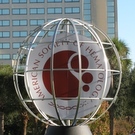Articles tagged with: Pomalidomide
News»

The 47th annual meeting of the American Society of Clinical Oncology (ASCO) will take place Friday, June 3, through Tuesday, June 7, in Chicago.
More than 30,000 clinical specialists from all over the world are expected to attend the five-day meeting to discuss the current research in cancer treatment and care. This year’s meeting will primarily focus on the theme of “Patients, Pathways, Progress.”
The meeting will include many presentations and seminars focused specifically on multiple myeloma. The ASCO website currently lists over 40 myeloma-based abstracts.
The Myeloma Beacon will be …
News»

Thursday was the third day of the International Myeloma Workshop (IMW) in Paris. There were presentations from early morning through the evening.
Some of the highlights from the first part of Day 3 of the conference are summarized in this article. Highlights from the second part of the day are summarized in a separate article (see related Beacon news).
Treating Older, Newly Diagnosed Myeloma Patients
The first session of the morning was about treating newly diagnosed multiple myeloma patients over the age of 65 years, specifically those who are ineligible for …
News, Opinion»

Each year at the Annual Meeting of the American Society of Hematology we hear about dozens of new drugs that are able to annihilate multiple myeloma cells in the test tube and in animal models. Unfortunately, at the same meeting, we also sit through presentations and walk by posters of drugs that looked hot in the laboratory but then fail to work when given to real patients with myeloma.
This is not new. It has been the story with myeloma for ages. The myeloma cells are smart and are seemingly able to …
News»

Results of a recent study conducted by the Mayo Clinic in Rochester, Minnesota, indicate that pomalidomide (Pomalyst) may be effective in patients who develop extramedullary disease during treatment with thalidomide, Revlimid, or Velcade.
However, the results also showed these patients had shorter overall survival times than patients who did not develop extramedullary disease during treatment.
The study authors indicated that further studies are required to determine whether novel drugs directly increase the likelihood of developing extramedullary disease.
“We don't know if we are seeing [the development of extramedullary …
News»

Dr. Kenneth Anderson, a world-renowned myeloma specialist, physician and researcher at Dana-Farber Cancer Institute, and Kraft Family Professor at Harvard Medical School, spoke with The Myeloma Beacon about his approach to treating multiple myeloma patients.
This article is the second part of a two-part series based on The Myeloma Beacon’s interview with Dr. Anderson. It will cover Dr. Anderson’s thoughts on where myeloma treatment is headed in the coming years. For more information on Dr. Anderson’s current approach to treating multiple myeloma, please see part one of this series.
Emerging Therapies …
News»

Results of a recent study show that multiple myeloma patients who were initially treated with either thalidomide or Revlimid demonstrated strong responses to treatment with Revlimid and pomalidomide following relapse. In particular, researchers observed the highest response rates in patients who received treatment with pomalidomide.
Dr. Sumit Madan of Mayo Clinic in Rochester, Minnesota, presented the study results at the American Society of Hematology annual meeting in Orlando last month.
Research has previously shown that thalidomide (Thalomid) and Revlimid (lenalidomide), which belong to the same class of drugs …
News»

This Monday was the third full day of the American Society of Hematology 2010 annual meeting, and it was packed with multiple myeloma-related presentations. The Beacon published an update earlier today covering presentations made Monday morning. This article covers material from Monday afternoon and evening.
The first presentation of the afternoon was by Dr. Ruben Niesvizky of the Weill Cornell Medical College in New York. He reported on the results of a Phase 3 trial using Velcade (bortezomib)-based initial treatment (induction) regimens combined with weekly Velcade maintenance therapy (abstract).
Patients in this trial were newly …
